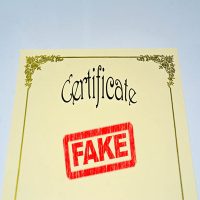Not All Fake Documents Are Forgery

Fake isn’t always bad. How many extraverts have cultivated their social confidence by adopting a “fake it ‘til you make it” strategy; fake sociability can get you through a social occasion as easily as real sociability. Likewise, imitations of expensive consumer products are often just as good as the real thing; “my jewelry is fake, but my smile is real” is a good recipe for happiness. Fake is only bad when someone else is making financial decisions based on the belief that the fake thing is real. There is no harm whatsoever in carrying a fake Louis Vuitton purse, and there is no harm in selling fake Louis Vuitton purses dirt cheap; the problems start when you sell fake Louis Vuitton purses at real Louis Vuitton prices. The intent to defraud is what separates the crime of forgery from situations in which the bearer and the recipient of a fake document are willing participants in a harmless fiction. If you are being accused of a crime such as forgery, contact a Tampa white collar crime lawyer.
The Case of the Pastor and the Quit Claim Deed
James Edward Smith II is a pastor at New Jerusalem Baptist Church in Broward County. The Florida Department of Law Enforcement alleges that he forged a quit claim deed to grant him ownership of the church building. A quit claim deed is a legal document that transfers ownership of a real estate property from one party to another without an exchange of money. Once the building was in his possession, he sold it for $600,000. He allegedly used the money to buy drugs, since, when police searched his house, they found cannabis, heroin, and methamphetamine. Smith also allegedly wrote $1,600 of bad checks drawn on the church’s bank account.
Smith is facing forgery charges both for the checks and for the quit claim deed. From a legal perspective, check forgery is the least serious forgery charge a defendant can face. If the amount for which the forged check is payable is less than $150, then forgery is a first-degree misdemeanor, but if it is greater, then it is a third-degree felony. The maximum penalty for a conviction for misdemeanor forgery is one year in county jail. Charges of third-degree felony forgery also apply when a defendant is accused of forging any other kind of document besides a check. The maximum penalty for a felony forgery conviction is a $5,000 fine, five years in state prison, and five years of probation.
If you get accused of forgery, you may be able to argue that you did not intend for the recipient to believe that the forged document was genuine. You might also be able to argue that there is not sufficient evidence to prove that you created or presented the forged document.
Contact Tampa Criminal Defense Attorney Bryant Scriven
A criminal defense lawyer can help you if you are facing criminal charges for forgery or another financial crime. Contact Scriven Law in Tampa, Florida to schedule a consultation.
Source:
patch.com/florida/miami/fl-pastor-stole-church-funds-support-drug-habit-authorities
